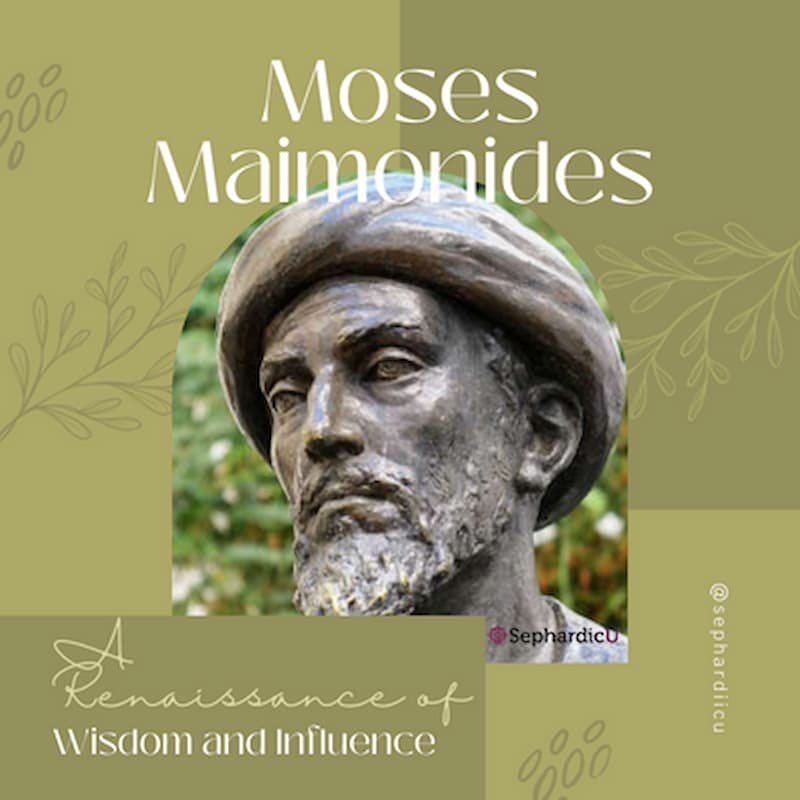Introduction
Moses ben Maimon, commonly known as Maimonides or Rambam, stands as one of the most influential Jewish thinkers and scholars of the medieval period. Born in Córdoba in 1138, his profound philosophical and medical contributions continue to shape Jewish thought and medical ethics. In the midst of the convulsions of the Almohad Caliphate, which forcibly converted many Jews and Muslims to Islam, Maimonides’ family fled to Fez, Morocco, before eventually settling in Fustat, Egypt. There, Maimonides flourished intellectually, becoming renowned not only within Jewish circles but also among Islamic scholars and Christian theologians.
| Points | Details |
|---|---|
| AKA | Maimonides, Rambam |
| Born | 1138 |
| Place of Birth | Córdoba, Al-Andalus |
| Died | 1204 |
| Place of Death | Fustat, Ayyubid Sultanate of Egypt |
| Occupation(s) | Philosopher, Physician, Rabbi |
| Notable Works | “Mishneh Torah,” “Guide for the Perplexed,” Medical Treatises |
Moses ben Maimon (Maimonides, Rambam) – Early Years
From an early age, Maimonides exhibited exceptional intellectual curiosity and aptitude. His education encompassed the study of Jewish religious texts, secular sciences, and philosophy, drawing from the rich tapestry of Jewish, Islamic, and Greek learning that characterized the cultural milieu of Al-Andalus and the wider Mediterranean world. It was this diverse and rigorous education that laid the foundation for Maimonides’ later scholarly endeavors.
Despite facing numerous challenges and adversities throughout his life, including the loss of family members and periods of persecution, Maimonides remained steadfast in his commitment to intellectual inquiry and the pursuit of truth. His writings reflect a deep engagement with a wide range of subjects, including theology, metaphysics, ethics, law, medicine, and astronomy, demonstrating his extraordinary breadth of knowledge and analytical acumen.
Reputation
Throughout his lifetime, Maimonides earned a reputation as a towering figure in the Jewish community and beyond. His philosophical masterpiece, the “Guide for the Perplexed,” and his comprehensive legal code, the “Mishneh Torah,” solidified his status as a preeminent authority in Jewish philosophy and law. Moreover, his medical treatises and ethical writings revolutionized the practice of medicine and laid the groundwork for future developments in medical ethics.
In the centuries since his passing, Maimonides’ influence has only grown, with his works continuing to inspire scholars, theologians, philosophers, and medical professionals worldwide. As we delve into the life and legacy of Moses ben Maimon, we are reminded of the enduring relevance of his teachings and the profound impact of his intellectual contributions on the shaping of Jewish thought and the broader intellectual landscape of the medieval world.
Early Life and Education
Moses ben Maimon received a comprehensive education in Jewish religious texts, secular sciences, and philosophy. Growing up in the intellectually vibrant milieu of Al-Andalus, he was exposed to a rich tapestry of Jewish, Islamic, and Greek learning, which informed his intellectual development.
Rise to Prominence
Moses ben Maimon’s intellectual prowess quickly gained him recognition as a leading figure in Sephardic Jewry. His philosophical masterpiece, the “Guide for the Perplexed,” and his comprehensive legal code, the “Mishneh Torah,” solidified his reputation as a preeminent authority in Jewish philosophy and law.
Notable Works
Among Moses ben Maimon’s most significant works is the “Mishneh Torah,” a comprehensive codification of Jewish law that remains a foundational text in Jewish legal studies. Additionally, his “Guide for the Perplexed” explores the reconciliation of religious faith and philosophical inquiry, offering profound insights into theology and metaphysics.
Influence and Legacy
Moses ben Maimon’s influence extended far beyond the Jewish community, shaping the course of medieval philosophy and medicine. Revered for his rationalist approach to theology and his emphasis on intellectual inquiry, he continues to be celebrated as a towering figure in the history of Jewish thought and philosophy.
Commemoration
In recognition of his enduring legacy, Moses ben Maimon is commemorated in academic institutions, cultural centers, and medical societies worldwide. His philosophical and legal works are studied and revered for their intellectual depth and moral insight, ensuring that his contributions to Jewish thought and medical ethics remain relevant in the modern era.
Conclusion: Moses ben Maimon
In conclusion, Moses ben Maimon stands as a beacon of intellectual brilliance and moral integrity in the annals of Jewish history. His philosophical insights, legal writings, and medical treatises continue to inspire scholars and practitioners alike, reaffirming his status as the sage of Sepharad whose legacy transcends time and place.








Ohr HaChaim Yomi – Emor